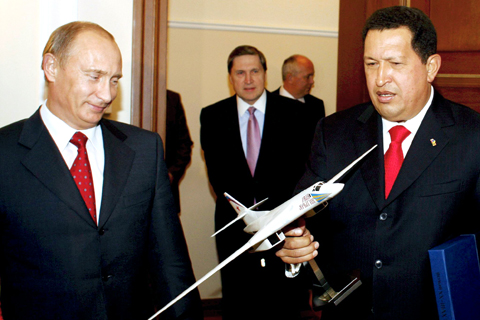Venezuelan President Hugo Chavez was to meet Russian counterpart Dmitry Medvedev yesterday after Russia risked Washington’s wrath by offering the fierce US foe help developing nuclear energy.
The two were to meet in the city of Orenburg after hawkish Russian Prime Minister Vladimir Putin told Chavez in Moscow on Thursday that Russia was “ready to consider the possibility of cooperation in nuclear energy.”
The countries have boosted ties in recent weeks following sharp US criticism of Russia’s incursion into Georgia, with Moscow dispatching long-range bombers and warships to Venezuela for exercises near US waters.

PHOTO: EPA
Putin made the nuclear offer after Russia this week delayed talks with the US and other powers on fears Iran is developing nuclear weapons, concerns critics say have been exacerbated by civilian nuclear technology provided by Moscow.
Chavez called for increased ties with Russia as a counter-balance to US power.
MULTI-POLAR WORLD
“Today like never before all that you said on the multi-polar world becomes reality. Let us not lose time,” Chavez told Putin. “The world is fast developing geopolitically.”
In deployments not seen since the Cold War, Russia this month sent two long-range bombers to Venezuela for exercises and has dispatched a flotilla of warships from the Arctic base of Severomorsk to Venezuela, near US waters.
Putin thanked Chavez for the “warm welcome” given to the planes and said South America was growing in importance for Moscow.
“Latin America has become an important chain-link in creating a multipolar world, and we will pay more attention to this vector,” he said.
Russia’s relations with the US are in a deep chill, most recently over the brief war in Georgia last month — a conflict where Chavez was one of the few world leaders to support Moscow.
During that war, Washington angered Moscow by holding naval exercises near its Black Sea coast. And when the war ended, the US used warships to deliver humanitarian aid to Georgia.
Chavez and Medvedev were expected to touch on military and energy cooperation in yesterday’s talks, a Kremlin official said. The Kremlin on Thursday announced that Russia had granted Venezuela a US$1 billion loan to buy Russian arms.
ARMS
Venezuela has signed deals for US$4.4 billion worth of Russian arms since 2005, including fighter jets, tanks and assault rifles.
Russia’s Kommersant daily reported last week that Venezuela was planning to purchase anti-aircraft systems, armored personnel carriers and more combat aircraft.
Chavez arrived in Russia from China and will continue on to France as part of a world tour ahead of local elections in Venezuela in November.
It is his third trip to Russia since June of last year.

Nauru has started selling passports to fund climate action, but is so far struggling to attract new citizens to the low-lying, largely barren island in the Pacific Ocean. Nauru, one of the world’s smallest nations, has a novel plan to fund its fight against climate change by selling so-called “Golden Passports.” Selling for US$105,000 each, Nauru plans to drum up more than US$5 million in the first year of the “climate resilience citizenship” program. Almost six months after the scheme opened in February, Nauru has so far approved just six applications — covering two families and four individuals. Despite the slow start —

MOGAMI-CLASS FRIGATES: The deal is a ‘big step toward elevating national security cooperation with Australia, which is our special strategic partner,’ a Japanese official said Australia is to upgrade its navy with 11 Mogami-class frigates built by Japan’s Mitsubishi Heavy Industries, Australian Minister for Defence Richard Marles said yesterday. Billed as Japan’s biggest defense export deal since World War II, Australia is to pay US$6 billion over the next 10 years to acquire the fleet of stealth frigates. Australia is in the midst of a major military restructure, bolstering its navy with long-range firepower in an effort to deter China. It is striving to expand its fleet of major warships from 11 to 26 over the next decade. “This is clearly the biggest defense-industry agreement that has ever

DEADLY TASTE TEST: Erin Patterson tried to kill her estranged husband three times, police said in one of the major claims not heard during her initial trial Australia’s recently convicted mushroom murderer also tried to poison her husband with bolognese pasta and chicken korma curry, according to testimony aired yesterday after a suppression order lapsed. Home cook Erin Patterson was found guilty last month of murdering her husband’s parents and elderly aunt in 2023, lacing their beef Wellington lunch with lethal death cap mushrooms. A series of potentially damning allegations about Patterson’s behavior in the lead-up to the meal were withheld from the jury to give the mother-of-two a fair trial. Supreme Court Justice Christopher Beale yesterday rejected an application to keep these allegations secret. Patterson tried to kill her

MILITARY’S MAN: Myint Swe was diagnosed with neurological disorders and peripheral neuropathy disease, and had authorized another to perform his duties Myint Swe, who became Myanmar’s acting president under controversial circumstances after the military seized power from the elected government of Aung San Suu Kyi more than four years ago, died yesterday, the military said. He was 74. He died at a military hospital in the capital, Naypyidaw, in the morning, Myanmar’s military information office said in a statement. Myint Swe’s death came more than a year after he stopped carrying out his presidential duties after he was publicly reported to be ailing. His funeral is to be held at the state level, but the date had not been disclosed, a separate statement from the